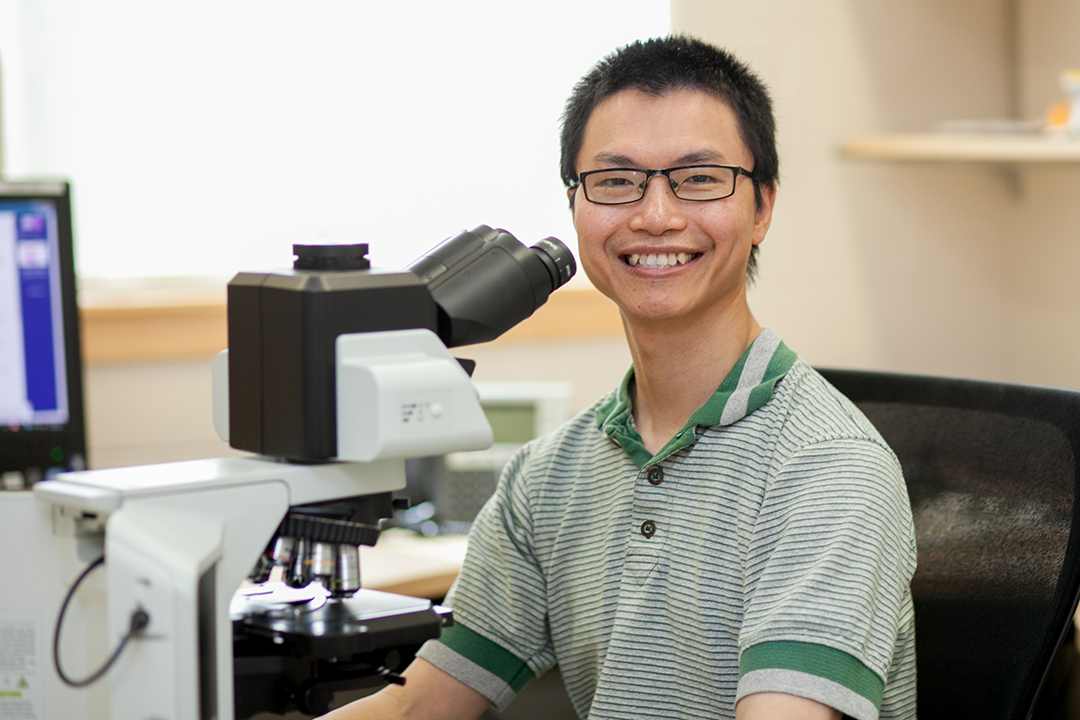
Guarding animal health on the Prairies
Dr. Yanyun Huang has ambitious goals for Prairie Diagnostic Services (PDS).
By Katie Brickman-YoungHuang was announced as the new chief executive officer (CEO) of the provincial veterinary laboratory in February 2020 and hopes the organization can strengthen and develop new partnerships.
“The organization was in good shape when I stepped in as CEO, so I am trying to build on this good base and further advance PDS,” says Huang. “We are in a very important position to guard animal health on the Prairies.”
PDS is a non-profit corporation that’s based on a partnership between the Province of Saskatchewan and the University of Saskatchewan (USask). PDS provides a full range of animal health laboratory diagnostic services for Western Canada including anatomic pathology, clinical pathology, immunology, virology, bacteriology, molecular biology and toxicology.
The organization’s laboratories and offices are located at the Western College of Veterinary Medicine (WCVM).
Huang joined the PDS team as an anatomic veterinary pathologist in 2013, but he first came to the WCVM as a veterinary graduate student in 2005. Originally from China, Huang earned his veterinary and master’s degrees at South China Agriculture University before moving to Canada.
After finishing a Master of Science degree in 2008, Huang went on to complete his PhD degree and board certification with the American College of Veterinary Pathologists in 2014.
“Being around this building now for about 15 years [has] helped me to do my job,” says Huang. “People know me, they show support, and they help me.”
Huang slowly eased into management roles at PDS over the years and was director of diagnostics before stepping in as interim CEO in June 2019. He was officially named as CEO in February 2020.
The focus for Huang in his new role will be strengthening partnerships with the WCVM, other colleges at USask, the western provinces and industry sectors to provide critical veterinary diagnostic support.
“We are always expanding and looking at the needs of the industries and our clients. That is an ongoing effort,” says Huang. “We want to do an even better job at being client-focused. We produce reliable and timely reports to our clients, but we want to further the service side of PDS so that our clients are getting the support they need.”
Those partnerships are crucial for PDS. The WCVM’s Veterinary Medical Centre (VMC) needs diagnostic services for its clients and the Saskatchewan Ministry of Agriculture needs PDS to provide essential testing for production animals.
PDS also works closely with veterinary clinics in Saskatchewan and in Western Canada. The teams at PDS and the Vaccine and Infectious Disease Organization-International Vaccine Centre (VIDO-InterVac) have also worked collaboratively on research models.
“We need each other … the WCVM is very important and one of our largest clients. Clinicians around the province in the large and small animal clinics need our services,” says Huang. “The partnerships we have built are critical in protecting the health of companion animals and animal agriculture.”
Huang believes that PDS is a vital component in One Health, where the goal is attaining optimal health for people, animals and the environment.
Since being in his new role, Huang has been tested.
When the SARS-CoV-2 pandemic caused Saskatchewan to shut down everything but essential services in mid-March, the volume of diagnostic submissions dropped at PDS due to the sudden reduction in regular patient appointments at the VMC and other veterinary clinics across the province.
During the same period, PDS partnered with VIDO-InterVac to assist in its COVID-19 vaccine development. The veterinary pathology service at PDS is helping VIDO-InterVac researchers characterize the lesions that are produced on the animal models.
PDS is connected to the American Association of Veterinary Laboratory Diagnosticians (AAVLD) laboratory network. That system allows the team to learn from the responses of others, especially those laboratories in larger centres where the number of COVID-19 cases have been high.
Due to the pandemic, PDS also made changes to shifts and the number of staff in the building at one time to protect the health and safety of its 70 employees.
“The biggest challenge is as everyone else faces — the uncertainty of how things will go. As a not-for-profit organization, PDS does not have a lot of buffer to absorb the impact of COVID,” says Huang.
“However, we are committed to serving the veterinary community, animal agriculture and animal owners because we believe in One Health. The work that PDS does is fundamental to our society.”
With many services and businesses reopening in Saskatchewan, PDS has seen an increase in the number of diagnostic submissions over the past couple of months, similar to levels recorded during the same period in 2019.
The PDS team is also involved in testing or developing several initiatives that will potentially expand the lab’s diagnostic options in the future.
Visit the Prairie Diagnostic Services website for more information.
